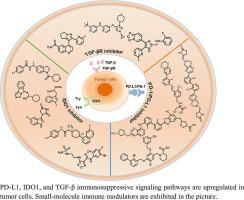当前位置:
X-MOL 学术
›
Bioorgan. Chem.
›
论文详情
Our official English website, www.x-mol.net, welcomes your feedback! (Note: you will need to create a separate account there.)
Small-molecule modulators of tumor immune microenvironment
Bioorganic Chemistry ( IF 5.1 ) Pub Date : 2024-02-29 , DOI: 10.1016/j.bioorg.2024.107251 Jing Zhang , Jia Yu , Meijing Liu , Zhizhong Xie , Xiaoyong Lei , Xiaoyan Yang , Sheng Huang , Xiangping Deng , Zhe Wang , Guotao Tang
Bioorganic Chemistry ( IF 5.1 ) Pub Date : 2024-02-29 , DOI: 10.1016/j.bioorg.2024.107251 Jing Zhang , Jia Yu , Meijing Liu , Zhizhong Xie , Xiaoyong Lei , Xiaoyan Yang , Sheng Huang , Xiangping Deng , Zhe Wang , Guotao Tang

|
In recent years, tumor immunotherapy, aimed at increasing the activity of immune cells and reducing immunosuppressive effects, has attracted wide attention. Among them, immune checkpoint blocking (ICB) is the most commonly explored therapeutic approach. All approved immune checkpoint inhibitors (ICIs) are clinically effective monoclonal antibodies (mAbs). Compared with biological agents, small-molecule drugs have many unique advantages in tumor immunotherapy. Therefore, they also play an important role. Immunosuppressive signals such as PD-L1, IDO1, and TGF-β, etc. overexpressed in tumor cells form the tumor immunosuppressive microenvironment. In addition, the efficacy of multi-pathway combined immunotherapy has also been reported and verified. Here, we mainly reviewed the mechanism of tumor immunotherapy, analyzed the research status of small-molecule modulators, and discussed drug candidates' structure–activity relationship (SAR). It provides more opportunities for further research to design more immune small-molecule modulators with novel structures.
中文翻译:

肿瘤免疫微环境的小分子调节剂
近年来,以提高免疫细胞活性、减轻免疫抑制作用为目的的肿瘤免疫治疗引起了广泛关注。其中,免疫检查点阻断(ICB)是最常探索的治疗方法。所有批准的免疫检查点抑制剂(ICIs)都是临床有效的单克隆抗体(mAb)。与生物制剂相比,小分子药物在肿瘤免疫治疗中具有许多独特的优势。因此,它们也发挥着重要的作用。肿瘤细胞中过度表达的PD-L1、IDO1、TGF-β等免疫抑制信号形成肿瘤免疫抑制微环境。此外,多途径联合免疫治疗的疗效也已有报道和验证。在此,我们主要回顾了肿瘤免疫治疗的机制,分析了小分子调节剂的研究现状,并讨论了候选药物的构效关系(SAR)。它为进一步研究设计更多具有新颖结构的免疫小分子调节剂提供了更多机会。
更新日期:2024-02-29
中文翻译:

肿瘤免疫微环境的小分子调节剂
近年来,以提高免疫细胞活性、减轻免疫抑制作用为目的的肿瘤免疫治疗引起了广泛关注。其中,免疫检查点阻断(ICB)是最常探索的治疗方法。所有批准的免疫检查点抑制剂(ICIs)都是临床有效的单克隆抗体(mAb)。与生物制剂相比,小分子药物在肿瘤免疫治疗中具有许多独特的优势。因此,它们也发挥着重要的作用。肿瘤细胞中过度表达的PD-L1、IDO1、TGF-β等免疫抑制信号形成肿瘤免疫抑制微环境。此外,多途径联合免疫治疗的疗效也已有报道和验证。在此,我们主要回顾了肿瘤免疫治疗的机制,分析了小分子调节剂的研究现状,并讨论了候选药物的构效关系(SAR)。它为进一步研究设计更多具有新颖结构的免疫小分子调节剂提供了更多机会。



























 京公网安备 11010802027423号
京公网安备 11010802027423号